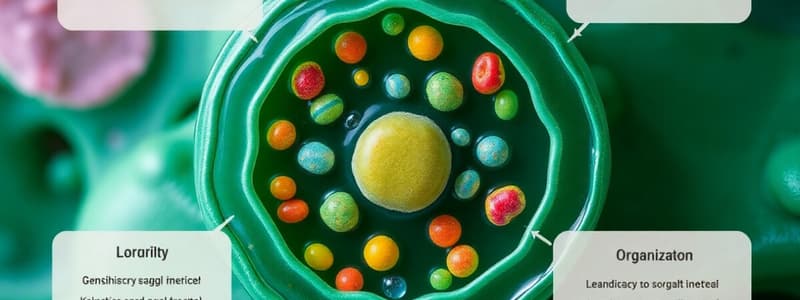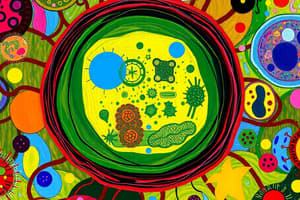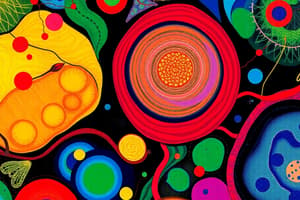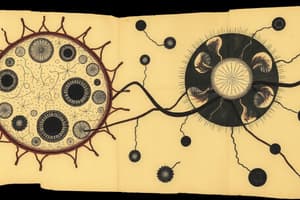Podcast
Questions and Answers
Which branch of biology focuses on the study of microorganisms?
Which branch of biology focuses on the study of microorganisms?
- Microbiology (correct)
- Ecology
- Botany
- Zoology
What is the fundamental unit of life according to the cell theory?
What is the fundamental unit of life according to the cell theory?
- Cell (correct)
- Molecule
- Organ
- Tissue
In which level of biological organization would you find a group of similar cells performing a specific function?
In which level of biological organization would you find a group of similar cells performing a specific function?
- Population
- Cell
- Organ
- Tissue (correct)
Which of the following is NOT considered a trophic level in an ecosystem?
Which of the following is NOT considered a trophic level in an ecosystem?
What is the main function of nucleic acids in living organisms?
What is the main function of nucleic acids in living organisms?
Which process explains the survival and reproduction of organisms best adapted to their environment?
Which process explains the survival and reproduction of organisms best adapted to their environment?
Which of the following is an example of an abiotic factor in an ecosystem?
Which of the following is an example of an abiotic factor in an ecosystem?
What is the role of the circulatory system in the human body?
What is the role of the circulatory system in the human body?
Flashcards
Plant Study
Plant Study
Botany is the scientific study of plants.
Animal Study
Animal Study
Zoology is the branch of biology dealing with animals.
Basic Unit of Life
Basic Unit of Life
A cell is the fundamental structural and functional unit of all living organisms.
Energy from Light
Energy from Light
Signup and view all the flashcards
Heredity Study
Heredity Study
Signup and view all the flashcards
Cell Division (Two Identical)
Cell Division (Two Identical)
Signup and view all the flashcards
Living Chemical Components
Living Chemical Components
Signup and view all the flashcards
Energy Transfer Sequence
Energy Transfer Sequence
Signup and view all the flashcards
Study Notes
Basic Branches of Biology
- Botany: Study of plants.
- Zoology: Study of animals.
- Microbiology: Study of microorganisms.
- Ecology: Study of ecosystems and interactions among organisms.
- Genetics: Study of heredity and variation.
Cell Theory
- All living organisms are made up of cells.
- The cell is the basic unit of life.
- All cells arise from pre-existing cells.
Levels of Biological Organization
- Molecule: Chemical structure consisting of at least two atoms.
- Cell: Basic unit of life.
- Tissue: Group of similar cells performing a specific function.
- Organ: Structure made of different tissues working together.
- Organ System: Group of organs that work together.
- Organism: Individual living entity.
- Population: Group of organisms of the same species.
- Community: Different populations living together.
- Ecosystem: Community plus its physical environment.
- Biosphere: Global sum of all ecosystems.
Major Biological Molecules
- Carbohydrates: Energy sources and structural components (e.g., starch, cellulose).
- Proteins: Perform various functions (e.g., enzymes, hormones); made of amino acids.
- Lipids: Energy storage, insulation, and cell membrane composition (e.g., fats, oils).
- Nucleic Acids: Genetic material (DNA and RNA).
Evolution and Natural Selection
- Theory of Evolution: Change in the heritable characteristics of biological populations over successive generations.
- Natural Selection: Process by which organisms better adapted to their environment tend to survive and produce more offspring.
- Adaptation: Trait that enhances survival and reproduction.
Genetics
- DNA (Deoxyribonucleic Acid): Carrier of genetic information.
- Gene: Segment of DNA responsible for heredity.
- Alleles: Different forms of a gene.
- Phenotype: Observable characteristics.
- Genotype: Genetic makeup.
Ecology Fundamentals
- Abiotic Factors: Non-living chemical and physical parts of the environment (e.g., sunlight, water).
- Biotic Factors: Living components of the environment (e.g., plants, animals).
- Food Chain: Linear sequence of energy transfer from one trophic level to another.
- Trophic Levels:
- Primary producers (plants)
- Primary consumers (herbivores)
- Secondary consumers (carnivores)
- Tertiary consumers (top predators)
Human Body Systems
- Circulatory System: Transports nutrients and oxygen throughout the body.
- Respiratory System: Exchanges gases (oxygen and carbon dioxide).
- Digestive System: Breaks down food into nutrients.
- Nervous System: Coordinates body responses and processes sensory information.
- Endocrine System: Regulates body functions through hormones.
Important Processes
- Photosynthesis: Process by which plants convert light energy into chemical energy (glucose).
- Cellular Respiration: Conversion of glucose and oxygen into energy (ATP), carbon dioxide, and water.
- Mitosis: Cell division resulting in two identical daughter cells.
- Meiosis: Type of cell division that reduces the chromosome number by half, producing gametes.
Studying That Suits You
Use AI to generate personalized quizzes and flashcards to suit your learning preferences.
Description
Test your understanding of the fundamental branches of biology, the cell theory, and the levels of biological organization. This quiz covers essential topics such as botany, zoology, and genetics, as well as key concepts like cells and ecosystems. Dive into the intricate world of biology and check your knowledge!




